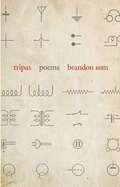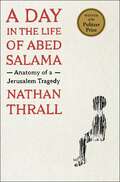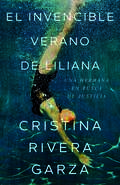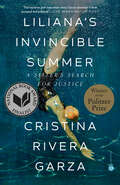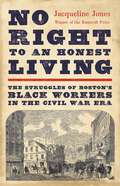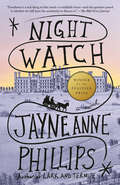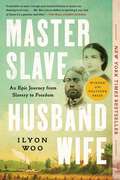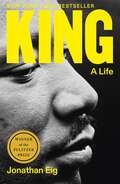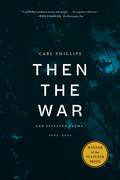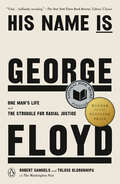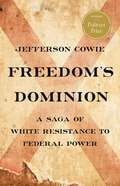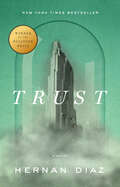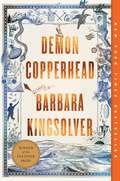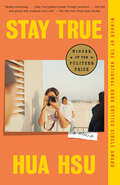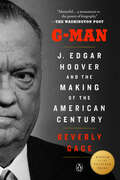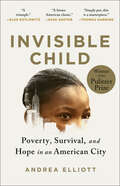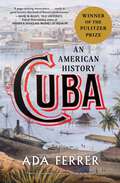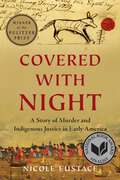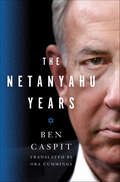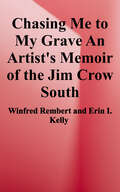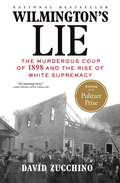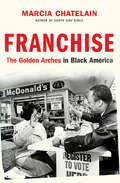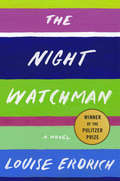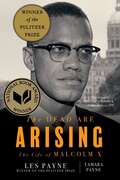Special Collections
Pulitzer Prize Award Winners
Description: Bookshare is pleased to offer the following titles, winners of the Pulitzer Prize Award. Note: Some drama winners are available and are listed under Fiction awards. #award
- Table View
- List View
Tripas
by Brandon SomWith Tripas, Brandon Som follows up his award-winning debut with a book of poems built out of a multicultural, multigenerational childhood home, in which he celebrates his Chicana grandmother, who worked nights on the assembly line at Motorola, and his Chinese American father and grandparents, who ran the family corner store. Enacting a como se dice poetics, a dialogic poem-making that inventively listens to heritage languages and transcribes family memory, Som participates in a practice of mem(oir), placing each poem's ear toward a confluence of history, labor, and languages, while also enacting a kind of "telephone" between cultures. Invested in the circuitry and circuitous routes of migration and labor, Som's lyricism weaves together the narratives of his transnational communities, bringing to light what is overshadowed in the reckless transit of global capitalism and imagining a world otherwise—one attuned to the echo in the hecho, the oracle in the orale.
A Day in the Life of Abed Salama
by Nathan ThrallImmersive and gripping, an intimate story of a deadly accident outside Jerusalem that unravels a tangle of lives, loves, enmities, and histories over the course of one revealing, heartbreaking day.
Five-year-old Milad Salama is excited for a school trip to a theme park on the outskirts of Jerusalem. On the way, his bus collides with a semitrailer. His father, Abed, gets word of the crash and rushes to the site. The scene is chaos—the children have been taken to different hospitals in Jerusalem and the West Bank; some are missing, others cannot be identified. Abed sets off on an odyssey to learn Milad’s fate. It is every parent’s worst nightmare, but for Abed it is compounded by the maze of physical, emotional, and bureaucratic obstacles he must navigate because he is Palestinian. He is on the wrong side of the separation wall, holds the wrong ID to pass the military checkpoints, and has the wrong papers to enter the city of Jerusalem. Abed’s quest to find Milad is interwoven with the stories of a cast of Jewish and Palestinian characters whose lives and histories unexpectedly converge.
In A Day in the Life of Abed Salama, Nathan Thrall—hailed for his “severe allergy to conventional wisdom” (Time)—offers an indelibly human portrait of the struggle over Israel/Palestine and a new understanding of the tragic history and reality of one of the most contested places on earth.
El invencible verano de Liliana / Liliana's Invincible Summer
by Cristina Rivera GarzaEste libro es para celebrar el paso de Liliana Rivera Garza por la tierra y para decirle que, claro que sí, lo vamos a tirar. Al patriarcado lo vamos a tirar. «El 16 de julio de 1990, Liliana Rivera Garza, mi hermana, fue víctima de un feminicidio. Era una muchacha de 20 años, estudiante de arquitectura. Tenía años tratando de terminar su relación con un novio de la preparatoria que insistía en no dejarla ir. Unas cuantas semanas antes de la tragedia, Liliana por fin tomó una decisión definitiva: en lo más crudo del invierto había descubierto que en ella, como bien lo había dicho Albert Camus, había un invencible verano. Lo dejaría atrás. Empezaría una nueva vida. Haría una maestría y después un doctorado; viajaría a Londres. «La decisión de él fue que ella no tendría una vida sin él. Hace apenas un año decidí abrir las cajas donde depositamos las pertenencias de mi hermana. Su voz atravesó el tiempo y, como la de tantas mujeres desaparecidas y ultrajadas en México, demandó justicia. «El invencible verano de Liliana es una excavación en la vida de una mujer brillante y audaz que careció, como nosotros mismos, como todos los demás, del lenguaje necesario para identificar, denunciar y luchar contra la violencia sexista y el terrorismo de pareja que caracteriza a tantas relaciones patriarcales.»
Liliana's Invincible Summer
by Cristina Rivera GarzaOctober 18, 2019. Cristina Rivera Garza travels from her home in Texas to Mexico City, in search of an old, unresolved criminal file. “My name is Cristina Rivera Garza,” she writes in her request to the attorney general, “and I am writing to you as a relative of Liliana Rivera Garza, who was murdered on July 16, 1990.” It’s been twenty-nine years. Twenty-nine years, three months, and two days since Liliana was murdered by an abusive ex-boyfriend. Inspired by feminist movements across the world and enraged by the global epidemic of femicide and intimate partner violence, Cristina embarks on a path toward justice. Liliana’s Invincible Summer is the account—and the outcome—of that quest .
In luminous, poetic prose, Rivera Garza tells a singular yet universally resonant story: Liliana is a spirited, wondrously hopeful young woman who tried to survive in a world of increasingly normalized gendered violence. Rivera Garza traces her sister’s history, depicting everything from Liliana’s early romance with a handsome but possessive and short-tempered man to that exhilarating final summer of 1990 when she loved, thought, and traveled more widely and freely than she ever had before.
Using her skills as an acclaimed scholar, novelist, and poet, Rivera Garza collected and curated evidence—handwritten letters, police reports, school notebooks, interviews with Liliana’s loved ones—to document her sister’s life. Through this remarkable and genre-defying memoir, she confronts the trauma of losing her sister and examines how this tragedy continues to shape who she is—and what she fights for—today.
No Right to An Honest Living (Winner of the Pulitzer Prize)
by Jacqueline JonesWINNER OF THE PULITZER PRIZE IN HISTORY A &“sensitive, immersive, and exhaustive&” portrait of Black workers and white hypocrisy in nineteenth-century Boston, from &“a gifted practitioner of labor history and urban history&” (Tiya Miles, National Book Award-winning author of All That She Carried) Impassioned antislavery rhetoric made antebellum Boston famous as the nation&’s hub of radical abolitionism. In fact, however, the city was far from a beacon of equality. In No Right to an Honest Living, historian Jacqueline Jones reveals how Boston was the United States writ small: a place where the soaring rhetoric of egalitarianism was easy, but justice in the workplace was elusive. Before, during, and after the Civil War, white abolitionists and Republicans refused to secure equal employment opportunity for Black Bostonians, condemning most of them to poverty. Still, Jones finds, some Black entrepreneurs ingeniously created their own jobs and forged their own career paths. Highlighting the everyday struggles of ordinary Black workers, this book shows how injustice in the workplace prevented Boston—and the United States—from securing true equality for all.
Night Watch (Pulitzer Prize Winner)
by Jayne Anne PhillipsPULITZER PRIZE WINNER • LONGLISTED FOR THE NATIONAL BOOK AWARD IN FICTION • A NEW YORKER BEST BOOK OF THE YEAR • From one of our most accomplished novelists, a mesmerizing story about a mother and daughter seeking refuge in the chaotic aftermath of the Civil War—and a brilliant portrait of family endurance against all odds"A tour de force." —Tayari Jones, author of An American MarriageIn 1874, in the wake of the War, erasure, trauma, and namelessness haunt civilians and veterans, renegades and wanderers, freedmen and runaways. Twelve-year-old ConaLee, the adult in her family for as long as she can remember, finds herself on a buckboard journey with her mother, Eliza, who hasn&’t spoken in more than a year. They arrive at the Trans-Allegheny Lunatic Asylum in West Virginia, delivered to the hospital&’s entrance by a war veteran who has forced himself into their world. There, far from family, a beloved neighbor, and the mountain home they knew, they try to reclaim their lives.The omnipresent vagaries of war and race rise to the surface as we learn their story: their flight to the highest mountain ridges of western Virginia; the disappearance of ConaLee&’s father, who left for the War and never returned. Meanwhile, in the asylum, they begin to find a new path. ConaLee pretends to be her mother&’s maid; Eliza responds slowly to treatment. They get swept up in the life of the facility—the mysterious man they call the Night Watch; the orphan child called Weed; the fearsome woman who runs the kitchen; the remarkable doctor at the head of the institution.Epic, enthralling, and meticulously crafted, Night Watch is a stunning chronicle of surviving war and its aftermath.
Master Slave Husband Wife
by Ilyon WooWinner of the 2024 Pulitzer Prize in Biography &“A rich narrative of the Crafts, an enslaved couple who escaped from Georgia in 1848, with light-skinned Ellen disguised as a disabled white gentleman and William as her manservant, exploiting assumptions about race, class, and disability to hide in public on their journey to the North, where they became famous abolitionists while evading bounty hunters.&” —The Pulitzer Prizes Named one of the best books of the year by The New York Times, The New Yorker, Time, NPR, Smithsonian Magazine, and Oprah DailyIn 1848, a year of international democratic revolt, a young, enslaved couple, Ellen and William Craft, achieved one of the boldest feats of self-emancipation in American history. Posing as master and slave, while sustained by their love as husband and wife, they made their escape together across more than 1,000 miles, riding out in the open on steamboats, carriages, and trains that took them from bondage in Georgia to the free states of the North.Along the way, they dodged slave traders, military officers, and even friends of their enslavers, who might have revealed their true identities. The tale of their adventure soon made them celebrities, and generated headlines around the country. Americans could not get enough of this charismatic young couple, who traveled another 1,000 miles criss-crossing New England, drawing thunderous applause as they spoke alongside some of the greatest abolitionist luminaries of the day—among them Frederick Douglass and William Wells Brown.But even then, they were not out of danger. With the passage of an infamous new Fugitive Slave Act in 1850, all Americans became accountable for returning refugees like the Crafts to slavery. Then yet another adventure began, as slave hunters came up from Georgia, forcing the Crafts to flee once again—this time from the United States, their lives and thousands more on the line and the stakes never higher.With three epic journeys compressed into one monumental bid for freedom, Master Slave Husband Wife is an American love story—one that would challenge the nation&’s core precepts of life, liberty, and justice for all—one that challenges us even now.
King: A Life
by Jonathan EigWINNER OF THE 2024 PULITZER PRIZE FOR BIOGRAPHYA finalist for the 2023 National Book Critics Circle Award | Named one of the ten best books of 2023 by The Washington Post, Chicago Tribune, and TimeA New York Times bestseller and notable book of 2023 | One of Barack Obama’s favorite books of 2023One of The New Yorker’s essential reads of 2023 | A Christian Science Monitor best book of the year | One of Air Mail’s twelve best books of 2023A Washington Post and national indie bestseller | One of Publishers Weekly’s best nonfiction books of 2023 | One of Smithsonian magazine’s ten best books of 2023“Supple, penetrating, heartstring-pulling and compulsively readable . . . Eig’s book is worthy of its subject.” —Dwight Garner, The New York Times (Editors’ Choice)“[King is] infused with the narrative energy of a thriller . . . The most compelling account of King’s life in a generation.” —Mark Whitaker, The Washington Post“No book could be more timely than Jonathan Eig’s sweeping and majestic new King . . . Eig has created 2023′s most vital tome.” —Will Bunch, The Philadelphia InquirerHailed by The New York Times as “the new definitive biography,” King mixes revelatory new research with accessible storytelling to offer an MLK for our times.Vividly written and exhaustively researched, Jonathan Eig’s King: A Life is the first major biography in decades of the civil rights icon Martin Luther King Jr.—and the first to include recently declassified FBI files. In this revelatory new portrait of the preacher and activist who shook the world, the bestselling biographer gives us an intimate view of the courageous and often emotionally troubled human being who demanded peaceful protest for his movement but was rarely at peace with himself. He casts fresh light on the King family’s origins as well as MLK’s complex relationships with his wife, father, and fellow activists. King reveals a minister wrestling with his own human frailties and dark moods, a citizen hunted by his own government, and a man determined to fight for justice even if it proved to be a fight to the death. As he follows MLK from the classroom to the pulpit to the streets of Birmingham, Selma, and Memphis, Eig dramatically re-creates the journey of a man who recast American race relations and became our only modern-day founding father—as well as the nation’s most mourned martyr.In this landmark biography, Eig gives us an MLK for our times: a deep thinker, a brilliant strategist, and a committed radical who led one of history’s greatest movements, and whose demands for racial and economic justice remain as urgent today as they were in his lifetime.Includes 8 pages of black-and-white photographs
Then the War
by Carl PhillipsA new collection of poems from one of America’s most essential, celebrated, and enduring poets, Carl Phillips's Then the War
I’m a song, changing. I’m a light
rain falling through a vast
darkness toward a different
darkness.
Carl Phillips has aptly described his work as an “ongoing quest;” Then the War is the next step in that meaningful process of self-discovery for both the poet and his reader. The new poems, written in a time of rising racial conflict in the United States, with its attendant violence and uncertainty, find Phillips entering deeper into the landscape he has made his own: a forest of intimacy, queerness, and moral inquiry, where the farther we go, the more difficult it is to remember why or where we started.
Then the War includes a generous selection of Phillips’s work from the previous thirteen years, as well as his recent lyric prose memoir, “Among the Trees,” and his chapbook, Star Map with Action Figures.
Ultimately, Phillips refuses pessimism, arguing for tenderness and human connection as profound forces for revolution and conjuring a spell against indifference and the easy escapes of nostalgia. Then the War is luminous testimony to the power of self-reckoning and to Carl Phillips as an ever-changing, necessary voice in contemporary poetry.
His Name Is George Floyd (Pulitzer Prize Winner)
by Robert Samuels and Toluse OlorunnipaFINALIST FOR THE NATIONAL BOOK AWARD AND LOS ANGELES TIMES BOOK PRIZE; SHORT-LISTED FOR THE J. ANTHONY LUKAS PRIZE; A BCALA 2023 HONOR NONFICTION AWARD WINNER. A landmark biography by two prizewinning Washington Post reporters that reveals how systemic racism shaped George Floyd's life and legacy—from his family&’s roots in the tobacco fields of North Carolina, to ongoing inequality in housing, education, health care, criminal justice, and policing—telling the story of how one man&’s tragic experience brought about a global movement for change.&“It is a testament to the power of His Name Is George Floyd that the book&’s most vital moments come not after Floyd&’s death, but in its intimate, unvarnished and scrupulous account of his life . . . Impressive.&” —New York Times Book Review (Editors' Choice)&“Since we know George Floyd&’s death with tragic clarity, we must know Floyd&’s America—and life—with tragic clarity. Essential for our times.&” —Ibram X. Kendi, author of How to Be an Antiracist &“A much-needed portrait of the life, times, and martyrdom of George Floyd, a chronicle of the racial awakening sparked by his brutal and untimely death, and an essential work of history I hope everyone will read.&” —Henry Louis Gates, Jr., author of The Black Church: This Is Our Story, This Is Our SongThe events of that day are now tragically familiar: on May 25, 2020, George Floyd became the latest Black person to die at the hands of the police, murdered outside of a Minneapolis convenience store by white officer Derek Chauvin. The video recording of his death set off a series of protests in the United States and around the world, awakening millions to the dire need for reimagining this country&’s broken systems of policing. But behind a face that would be graffitied onto countless murals, and a name that has become synonymous with civil rights, there is the reality of one man&’s stolen life: a life beset by suffocating systemic pressures that ultimately proved inescapable. This biography of George Floyd shows the athletic young boy raised in the projects of Houston&’s Third Ward who would become a father, a partner, a friend, and a man constantly in search of a better life. In retracing Floyd&’s story, Washington Post reporters Robert Samuels and Toluse Olorunnipa bring to light the determination Floyd carried as he faced the relentless struggle to survive as a Black man in America. Placing his narrative within the larger context of America&’s deeply troubled history of institutional racism, His Name Is George Floyd examines the Floyd family&’s roots in slavery and sharecropping, the segregation of his Houston schools, the overpolicing of his communities, the devastating snares of the prison system, and his attempts to break free from drug dependence—putting today's inequality into uniquely human terms. Drawing upon hundreds of interviews and extensive original reporting, Samuels and Olorunnipa offer a poignant and moving exploration of George Floyd&’s America, revealing how a man who simply wanted to breathe ended up touching the world.
Freedom’s Dominion (Winner of the Pulitzer Prize)
by Jefferson CowieWINNER OF THE PULITZER PRIZE IN HISTORYAn "important, deeply affecting—and regrettably relevant" (New York Times) chronicle of a sinister idea of freedom: white Americans&’ freedom to oppress others and their fight against the government that got in their way. American freedom is typically associated with the fight of the oppressed for a better world. But for centuries, whenever the federal government intervened on behalf of nonwhite people, many white Americans fought back in the name of freedom—their freedom to dominate others. In Freedom&’s Dominion, historian Jefferson Cowie traces this complex saga by focusing on a quintessentially American place: Barbour County, Alabama, the ancestral home of political firebrand George Wallace. In a land shaped by settler colonialism and chattel slavery, white people weaponized freedom to seize Native lands, champion secession, overthrow Reconstruction, question the New Deal, and fight against the civil rights movement. A riveting history of the long-running clash between white people and federal authority, this book radically shifts our understanding of what freedom means in America.
Trust
by Hernan DiazAn unparalleled novel about money, power, intimacy, and perception.
Even through the roar and effervescence of the 1920s, everyone in New York has heard of Benjamin and Helen Rask. He is a legendary Wall Street tycoon; she is the daughter of eccentric aristocrats. Together, they have risen to the very top of a world of seemingly endless wealth—all as a decade of excess and speculation draws to an end. But at what cost have they acquired their immense fortune?
This is the mystery at the center of Bonds, a successful 1937 novel that all of New York seems to have read. Yet there are other versions of this tale of privilege and deceit.
Hernan Diaz’s TRUST elegantly puts these competing narratives into conversation with one another—and in tension with the perspective of one woman bent on disentangling fact from fiction. The result is a novel that spans over a century and becomes more exhilarating with each new revelation. At once an immersive story and a brilliant literary puzzle, TRUST engages the reader in a quest for the truth while confronting the deceptions that often live at the heart of personal relationships, the reality-warping force of capital, and the ease with which power can manipulate facts.
Demon Copperhead
by Barbara KingsolverWINNER OF THE 2023 PULITZER PRIZE • WINNER OF THE WOMEN'S PRIZE FOR FICTIONA New York Times "Ten Best Books of 2022" • An Oprah’s Book Club Selection • An Instant New York Times Bestseller • An Instant Wall Street Journal Bestseller • A #1 Washington Post Bestseller "Demon is a voice for the ages—akin to Huck Finn or Holden Caulfield—only even more resilient.” —Beth Macy, author of Dopesick"May be the best novel of 2022. . . . Equal parts hilarious and heartbreaking, this is the story of an irrepressible boy nobody wants, but readers will love.” (Ron Charles, Washington Post)From the acclaimed author of The Poisonwood Bible and The Bean Trees, a brilliant novel that enthralls, compels, and captures the heart as it evokes a young hero’s unforgettable journey to maturitySet in the mountains of southern Appalachia, Demon Copperhead is the story of a boy born to a teenaged single mother in a single-wide trailer, with no assets beyond his dead father’s good looks and copper-colored hair, a caustic wit, and a fierce talent for survival. Relayed in his own unsparing voice, Demon braves the modern perils of foster care, child labor, derelict schools, athletic success, addiction, disastrous loves, and crushing losses. Through all of it, he reckons with his own invisibility in a popular culture where even the superheroes have abandoned rural people in favor of cities.Many generations ago, Charles Dickens wrote David Copperfield from his experience as a survivor of institutional poverty and its damages to children in his society. Those problems have yet to be solved in ours. Dickens is not a prerequisite for readers of this novel, but he provided its inspiration. In transposing a Victorian epic novel to the contemporary American South, Barbara Kingsolver enlists Dickens’ anger and compassion, and above all, his faith in the transformative powers of a good story. Demon Copperhead speaks for a new generation of lost boys, and all those born into beautiful, cursed places they can’t imagine leaving behind.
Stay True
by Hua HsuPULITZER PRIZE WINNER • NEW YORK TIMES BESTSELLER • A gripping memoir on friendship, grief, the search for self, and the solace that can be found through art, by the New Yorker staff writer Hua Hsu&“This book is exquisite and excruciating and I will be thinking about it for years and years to come.&” —Rachel Kushner, New York Times bestselling author of The Flamethrowers and The Mars RoomIn the eyes of eighteen-year-old Hua Hsu, the problem with Ken—with his passion for Dave Matthews, Abercrombie & Fitch, and his fraternity—is that he is exactly like everyone else. Ken, whose Japanese American family has been in the United States for generations, is mainstream; for Hua, the son of Taiwanese immigrants, who makes &’zines and haunts Bay Area record shops, Ken represents all that he defines himself in opposition to. The only thing Hua and Ken have in common is that, however they engage with it, American culture doesn&’t seem to have a place for either of them.But despite his first impressions, Hua and Ken become friends, a friendship built on late-night conversations over cigarettes, long drives along the California coast, and the successes and humiliations of everyday college life. And then violently, senselessly, Ken is gone, killed in a carjacking, not even three years after the day they first meet.Determined to hold on to all that was left of one of his closest friends—his memories—Hua turned to writing. Stay True is the book he&’s been working on ever since. A coming-of-age story that details both the ordinary and extraordinary, Stay True is a bracing memoir about growing up, and about moving through the world in search of meaning and belonging.
G-Man (Pulitzer Prize Winner)
by Beverly GageWinner of the 2023 Pulitzer Prize in BiographyWinner of the 2022 National Book Critics Circle Award in Biography, the 2023 Bancroft Prize in American History and Diplomacy, and the 43rd LA Times Book Prize in Biography | Finalist for the 2023 PEN/Jacqueline Bograd Weld Award for BiographyNamed a Best Book of 2022 by The Atlantic, The Washington Post and Smithsonian Magazine and a New York Times Top 100 Notable Books of 2022 &“Masterful…This book is an enduring, formidable accomplishment, a monument to the power of biography [that] now becomes the definitive work&”—The Washington Post&“A nuanced portrait in a league with the best of Ron Chernow and David McCullough.&”—The Wall Street JournalA major new biography of J Edgar Hoover that draws from never-before-seen sources to create a groundbreaking portrait of a colossus who dominated half a century of American history and planted the seeds for much of today's conservative political landscape.We remember him as a bulldog--squat frame, bulging wide-set eyes, fearsome jowls--but in 1924, when he became director of the FBI, he had been the trim, dazzling wunderkind of the administrative state, buzzing with energy and big ideas for reform. He transformed a failing law-enforcement backwater, riddled with scandal, into a modern machine. He believed in the power of the federal government to do great things for the nation and its citizens. He also believed that certain people--many of them communists or racial minorities or both-- did not deserve to be included in that American project. Hoover rose to power and then stayed there, decade after decade, using the tools of state to create a personal fiefdom unrivaled in U.S. history. Beverly Gage&’s monumental work explores the full sweep of Hoover&’s life and career, from his birth in 1895 to a modest Washington civil-service family through his death in 1972. In her nuanced and definitive portrait, Gage shows how Hoover was more than a one-dimensional tyrant and schemer who strong-armed the rest of the country into submission. As FBI director from 1924 through his death in 1972, he was a confidant, counselor, and adversary to eight U.S. presidents, four Republicans and four Democrats. Franklin Roosevelt and Lyndon Johnson did the most to empower him, yet his closest friend among the eight was fellow anticommunist warrior Richard Nixon. Hoover was not above blackmail and intimidation, but he also embodied conservative values ranging from anticommunism to white supremacy to a crusading and politicized interpretation of Christianity. This garnered him the admiration of millions of Americans. He stayed in office for so long because many people, from the highest reaches of government down to the grassroots, wanted him there and supported what he was doing, thus creating the template that the political right has followed to transform its party.G-Man places Hoover back where he once stood in American political history--not at the fringes, but at the center--and uses his story to explain the trajectories of governance, policing, race, ideology, political culture, and federal power as they evolved over the course of the 20th century.
Invisible Child
by Andrea ElliottInvisible Child follows eight dramatic years in the life of a girl whose imagination is as soaring as the skyscrapers near her Brooklyn shelter. Dasani was named after the bottled water that signaled Brooklyn’s gentrification and the shared aspirations of a divided city.
In this sweeping narrative, Elliott weaves the story of Dasani’s childhood with the history of her family, tracing the passage of their ancestors from slavery to the Great Migration north. As Dasani comes of age, the homeless crisis in New York City has exploded amid the deepening chasm between rich and poor.
Dasani must guide her siblings through a city riddled by hunger, violence, drug addiction, homelessness, and the monitoring of child protection services. Out on the street, Dasani becomes a fierce fighter to protect the ones she loves. When she finally escapes city life to enroll in a boarding school, she faces an impossible question: What if leaving poverty means abandoning your family, and yourself?
By turns heartbreaking and inspiring, Invisible Child tells an astonishing story about the power of resilience, the importance of family, and the cost of inequality. Based on nearly a decade of reporting, Invisible Child illuminates some of the most critical issues in contemporary America through the life of one remarkable girl.
Cuba (Winner of the Pulitzer Prize)
by Dr. Ada FerrerWINNER OF THE PULITZER PRIZE IN HISTORY WINNER OF THE LOS ANGELES TIMES BOOK PRIZE IN HISTORY &“Full of…lively insights and lucid prose&” (The Wall Street Journal) an epic, sweeping history of Cuba and its complex ties to the United States—from before the arrival of Columbus to the present day—written by one of the world&’s leading historians of Cuba.In 1961, at the height of the Cold War, the United States severed diplomatic relations with Cuba, where a momentous revolution had taken power three years earlier. For more than half a century, the stand-off continued—through the tenure of ten American presidents and the fifty-year rule of Fidel Castro. His death in 2016, and the retirement of his brother and successor Raúl Castro in 2021, have spurred questions about the country&’s future. Meanwhile, politics in Washington—Barack Obama&’s opening to the island, Donald Trump&’s reversal of that policy, and the election of Joe Biden—have made the relationship between the two nations a subject of debate once more. Now, award-winning historian Ada Ferrer delivers an &“important&” (The Guardian) and moving chronicle that demands a new reckoning with both the island&’s past and its relationship with the United States. Spanning more than five centuries, Cuba: An American History provides us with a front-row seat as we witness the evolution of the modern nation, with its dramatic record of conquest and colonization, of slavery and freedom, of independence and revolutions made and unmade. Along the way, Ferrer explores the sometimes surprising, often troubled intimacy between the two countries, documenting not only the influence of the United States on Cuba but also the many ways the island has been a recurring presence in US affairs. This is a story that will give Americans unexpected insights into the history of their own nation and, in so doing, help them imagine a new relationship with Cuba; &“readers will close [this] fascinating book with a sense of hope&” (The Economist). Filled with rousing stories and characters, and drawing on more than thirty years of research in Cuba, Spain, and the United States—as well as the author&’s own extensive travel to the island over the same period—this is a stunning and monumental account like no other.
Covered with Night
by Nicole EustaceAn immersive tale of the killing of a Native American man and its far-reaching implications for the definition of justice from early America to today.
On the eve of a major treaty conference between Iroquois leaders and European colonists in the distant summer of 1722, two white fur traders attacked an Indigenous hunter and left him for dead near Conestoga, Pennsylvania. Though virtually forgotten today, this act of brutality set into motion a remarkable series of criminal investigations and cross-cultural negotiations that challenged the definition of justice in early America.
In Covered with Night, leading historian Nicole Eustace reconstructs the crime and its aftermath, bringing us into the overlapping worlds of white colonists and Indigenous peoples in this formative period. As she shows, the murder of the Indigenous man set the entire mid-Atlantic on edge, with many believing war was imminent.
Isolated killings often flared into colonial wars in North America, and colonists now anticipated a vengeful Indigenous uprising. Frantic efforts to resolve the case ignited a dramatic, far-reaching debate between Native American forms of justice—centered on community, forgiveness, and reparations—and an ideology of harsh reprisal, unique to the colonies and based on British law, which called for the killers’ swift execution.
In charting the far-reaching ramifications of the murder, Covered with Night—a phrase from Iroquois mourning practices—overturns persistent assumptions about “civilized” Europeans and “savage” Native Americans. As Eustace powerfully contends, the colonial obsession with “civility” belied the reality that the Iroquois, far from being the barbarians of the white imagination, acted under a mantle of sophistication and humanity as they tried to make the land- and power-hungry colonials understand their ways. In truth, Eustace reveals, the Iroquois—the Six Nations of the Haudenosaunee, as they are known today—saw the killing as an opportunity to forge stronger bonds with the colonists. They argued for restorative justice and for reconciliation between the two sides, even as they mourned the deceased.
An absorbing chronicle built around an extraordinary group of characters—from the slain man’s resilient widow to the Indigenous diplomat known as “Captain Civility” to the scheming governor of Pennsylvania—Covered with Night transforms a single event into an unforgettable portrait of early America. A necessary work of historical reclamation, it ultimately revives a lost vision of crime and punishment that reverberates down into our own time.
The Netanyahu Years
by Ben CaspitBenjamin Netanyahu is currently serving his fourth term in office as Prime Minister of Israel, the longest serving Prime Minister in the country’s history. Now Israeli journalist Ben Caspit puts Netanyahu’s life under a magnifying glass, focusing on his last two terms in office. "A biography of the steely Israeli prime minister that underscores his relentless, seemingly emotionless competitive drive … A highly readable portrait of an enigmatic politician." - Kirkus Reviews Caspit covers a wide swath of topics, including Netanyahu’s policies, his political struggles, and his fight against the Iranian nuclear program, and zeroes in on Netanyahu’s love/hate relationship with the American administration, America’s Jews, and his alliances with American business magnates. A timely and important book, The Netanyahu Years is a primer for anyone looking to understand this world leader.
Chasing Me to My Grave
by Erin I. Kelly and Winfred RembertWinfred Rembert grew up in a family of Georgia field laborers and joined the Civil Rights Movement as a teenager. He was arrested after fleeing a demonstration, survived a near-lynching at the hands of law enforcement, and spent seven years on chain gangs.
During that time he met the undaunted Patsy, who would become his wife. Years later, at the age of fifty-one and with Patsy's encouragement, he started drawing and painting scenes from his youth using leather tooling skills he learned in prison.
Chasing Me to My Grave presents Rembert's breathtaking body of work alongside his story, as told to Tufts Philosopher Erin I. Kelly. Rembert, calls forth vibrant scenes of Black life on Cuthbert, Georgia's Hamilton Avenue, where he first glimpsed the possibility of a life outside the cotton field. As he pays tribute, exuberant and heartfelt, to Cuthbert's Black community and the people, including Patsy, who helped him to find the courage to revisit a traumatic past, Rembert brings to life the promise and the danger of Civil Rights protest, the brutalities of incarceration, his search for his mother's love, and the epic bond he found with Patsy.
Vivid, confrontational, revelatory, and complex, Chasing Me to My Grave is a searing memoir in prose and painted leather that celebrates Black life and summons readers to confront painful and urgent realities at the heart of American history and society.
Postcolonial Love Poem
by Natalie DiazPostcolonial Love Poem is an anthem of desire against erasure. Natalie Diaz’s brilliant second collection demands that every body carried in its pages—bodies of language, land, rivers, suffering brothers, enemies, and lovers—be touched and held as beloveds. Through these poems, the wounds inflicted by America onto an indigenous people are allowed to bloom pleasure and tenderness: “Let me call my anxiety, desire, then. / Let me call it, a garden.” In this new lyrical landscape, the bodies of indigenous, Latinx, black, and brown women are simultaneously the body politic and the body ecstatic. In claiming this autonomy of desire, language is pushed to its dark edges, the astonishing dunefields and forests where pleasure and love are both grief and joy, violence and sensuality. Diaz defies the conditions from which she writes, a nation whose creation predicated the diminishment and ultimate erasure of bodies like hers and the people she loves: “I am doing my best to not become a museum / of myself. I am doing my best to breathe in and out. // I am begging: Let me be lonely but not invisible.” Postcolonial Love Poem unravels notions of American goodness and creates something more powerful than hope—in it, a future is built, future being a matrix of the choices we make now, and in these poems, Diaz chooses love.
Wilmington's Lie
by David ZucchinoBy the 1890s, Wilmington was North Carolina’s largest city and a shining example of a mixed-race community. It was a bustling port city with a burgeoning African American middle class and a Fusionist government of Republicans and Populists that included black aldermen, police officers and magistrates. There were successful black-owned businesses and an African American newspaper, The Record. But across the state—and the South—white supremacist Democrats were working to reverse the advances made by former slaves and their progeny. In 1898, in response to a speech calling for white men to rise to the defense of Southern womanhood against the supposed threat of black predators, Alexander Manly, the outspoken young Record editor, wrote that some relationships between black men and white women were consensual. His editorial ignited outrage across the South, with calls to lynch Manly. But North Carolina’s white supremacist Democrats had a different strategy. They were plotting to take back the state legislature in November “by the ballot or bullet or both,” and then use the Manly editorial to trigger a “race riot” to overthrow Wilmington’s multi-racial government. Led by prominent citizens including Josephus Daniels, publisher of the state’s largest newspaper, and former Confederate Colonel Alfred Moore Waddell, white supremacists rolled out a carefully orchestrated campaign that included raucous rallies, race-baiting editorials and newspaper cartoons, and sensational, fabricated news stories. With intimidation and violence, the Democrats suppressed the black vote and stuffed ballot boxes (or threw them out), to win control of the state legislature on November eighth. Two days later, more than 2,000 heavily armed Red Shirts swarmed through Wilmington, torching the Record office, terrorizing women and children, and shooting at least sixty black men dead in the streets. The rioters forced city officials to resign at gunpoint and replaced them with mob leaders. Prominent blacks—and sympathetic whites—were banished. Hundreds of terrified black families took refuge in surrounding swamps and forests. This brutal insurrection is a rare instance of a violent overthrow of an elected government in the U.S. It halted gains made by blacks and restored racism as official government policy, cementing white rule for another half century. It was not a “race riot,” as the events of November 1898 came to be known, but rather a racially motivated rebellion launched by white supremacists. In this book, the author uses contemporary newspaper accounts, diaries, letters and official communications to create a gripping and compelling narrative that weaves together individual stories of hate and fear and brutality. This is a dramatic and definitive account of a remarkable but forgotten chapter of American history.
Franchise
by Marcia ChatelainFrom civil rights to Ferguson, Franchise reveals the untold history of how fast food became one of the greatest generators of black wealth in America. Often blamed for the rising rates of obesity and diabetes among black Americans, fast food restaurants like McDonald’s have long symbolized capitalism’s villainous effects on our nation’s most vulnerable communities. But how did fast food restaurants so thoroughly saturate black neighborhoods in the first place? In Franchise, acclaimed historian Marcia Chatelain uncovers a surprising history of cooperation among fast food companies, black capitalists, and civil rights leaders, who—in the troubled years after King’s assassination—believed they found an economic answer to the problem of racial inequality. With the discourse of social welfare all but evaporated, federal programs under presidents Johnson and Nixon promoted a new vision for racial justice: that the franchising of fast food restaurants, by black citizens in their own neighborhoods, could finally improve the quality of black life. Synthesizing years of research, Franchise tells a troubling success story of an industry that blossomed the very moment a freedom movement began to whither.
The Night Watchman
by Louise ErdrichBased on the extraordinary life of National Book Award-winning author Louise Erdrich’s grandfather who worked as a night watchman and carried the fight against Native dispossession from rural North Dakota all the way to Washington, D.C., this powerful novel explores themes of love and death with lightness and gravity and unfolds with the elegant prose, sly humor, and depth of feeling of a master craftsman.
Thomas Wazhashk is the night watchman at the jewel bearing plant, the first factory located near the Turtle Mountain Reservation in rural North Dakota. He is also a Chippewa Council member who is trying to understand the consequences of a new “emancipation” bill on its way to the floor of the United States Congress. It is 1953 and he and the other council members know the bill isn’t about freedom; Congress is fed up with Indians. The bill is a “termination” that threatens the rights of Native Americans to their land and their very identity. How can the government abandon treaties made in good faith with Native Americans “for as long as the grasses shall grow, and the rivers run”?
Since graduating high school, Pixie Paranteau has insisted that everyone call her Patrice. Unlike most of the girls on the reservation, Patrice, the class valedictorian, has no desire to wear herself down with a husband and kids. She makes jewel bearings at the plant, a job that barely pays her enough to support her mother and brother. Patrice’s shameful alcoholic father returns home sporadically to terrorize his wife and children and bully her for money. But Patrice needs every penny to follow her beloved older sister, Vera, who moved to the big city of Minneapolis. Vera may have disappeared; she hasn’t been in touch in months, and is rumored to have had a baby.
Determined to find Vera and her child, Patrice makes a fateful trip to Minnesota that introduces her to unexpected forms of exploitation and violence, and endangers her life.Thomas and Patrice live in this impoverished reservation community along with young Chippewa boxer Wood Mountain and his mother Juggie Blue, her niece and Patrice’s best friend Valentine, and Stack Barnes, the white high school math teacher and boxing coach who is hopelessly in love with Patrice.
In the Night Watchman, Louise Erdrich creates a fictional world populated with memorable characters who are forced to grapple with the worst and best impulses of human nature. Illuminating the loves and lives, the desires and ambitions of these characters with compassion, wit, and intelligence, The Night Watchman is a majestic work of fiction from this revered cultural treasure.
A New York Times Bestseller
The Dead Are Arising
by Les Payne and Tamara PayneAn epic, award-winning biography of Malcolm X that draws on hundreds of hours of personal interviews and rewrites much of the known narrative. Les Payne, the renowned Pulitzer Prize–winning investigative journalist, embarked in 1990 on a nearly thirty-year-long quest to create an unprecedented portrait of Malcolm X, one that would separate fact from fiction. The result is this historic, National Book Award–winning biography, which interweaves previously unknown details of Malcolm X’s life—from harrowing Depression-era vignettes to a moment-by-moment retelling of the 1965 assassination—into an extraordinary account that contextualizes Malcolm X’s life against the wider currents of American history. Bookended by essays from Tamara Payne, Payne’s daughter and primary researcher, who heroically completed the biography after her father’s death in 2018, The Dead Are Arising affirms the centrality of Malcolm X to the African American freedom struggle.
